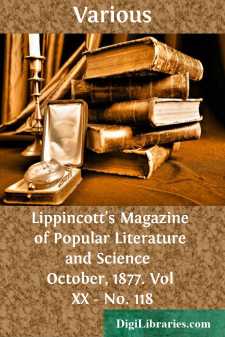Categories
- Antiques & Collectibles 13
- Architecture 36
- Art 48
- Bibles 22
- Biography & Autobiography 813
- Body, Mind & Spirit 142
- Business & Economics 28
- Children's Books 15
- Children's Fiction 12
- Computers 4
- Cooking 94
- Crafts & Hobbies 4
- Drama 346
- Education 46
- Family & Relationships 57
- Fiction 11828
- Games 19
- Gardening 17
- Health & Fitness 34
- History 1377
- House & Home 1
- Humor 147
- Juvenile Fiction 1873
- Juvenile Nonfiction 202
- Language Arts & Disciplines 88
- Law 16
- Literary Collections 686
- Literary Criticism 179
- Mathematics 13
- Medical 41
- Music 40
- Nature 179
- Non-Classifiable 1768
- Performing Arts 7
- Periodicals 1453
- Philosophy 64
- Photography 2
- Poetry 896
- Political Science 203
- Psychology 42
- Reference 154
- Religion 513
- Science 126
- Self-Help 84
- Social Science 81
- Sports & Recreation 34
- Study Aids 3
- Technology & Engineering 59
- Transportation 23
- Travel 463
- True Crime 29
Lippincott's Magazine of Popular Literature and Science October, 1877. Vol XX - No. 118
by: Various
Description:
Excerpt
Chester And The Dee.
Two Papers.—I.
The Dee Above Bala.The history of Chester is that of a key. It was the last city that gave up Harold's unlucky cause and surrendered to William the Conqueror, and the last that fell in the no less unlucky cause of the Stuart king against the Parliamentarians. In much earlier times it was held by the famous Twentieth Legion, the Valens Victrix, as the key of the Roman dominion in the north-west of Britain, and at present it has peculiarities of position, as well as of architecture, which make it unique in England and a lodestone to Americans. Curiously planted on the border of the newest and most bustling manufacturing district in England, close to the coalfields of North Wales, the mines of Lancashire, the quays of its sea-rival Liverpool and the mills of grimy, wealthy Manchester, it still exercises, besides its artistic and historic supremacy, a bonâ fide ecclesiastical sway over most of these new places. It is the first ancient city accessible to American travellers, many of whom have given practical tokens of their affectionate remembrance of it by largely subscribing to the fund for the restoration of the cathedral, a work that has already cost some eighty thousand pounds.
Caer-gai.The neighborhood of Chester is as suggestive of antiquity and foreigners as the city itself. Volumes might be written about the quaint, Dutch-like scenery of the low rich land reclaimed from the sea; the broad, sandy estuary of the Dee, with the square-headed peninsula, the Wirrall, which divides this quiet river from the noisy Mersey; the Hoylake, Parkgate and Neston fisher-folk on the sandy shores, with their queer lives, monotonous scratching-up of mussels and cockles, a never-failing trade, their terms of praise—"the biggest scrat," for instance, "in all the island," being the form of commendation for the woman who can with her rake at the end of a long pole scratch up most shellfish in a given time; the low, fertile green pastures, the creamy cheese and the eight yearly cheese-fairs. The city itself is the most foreign-looking in all England, and the inhabitants have the good taste to be proud of this. The river Dee—Milton's "wizard stream"—celebrated both by English and Welsh bards, is not seen to as much advantage under the walls of the Roman "camp" (castra=Chester) as elsewhere, but its bridges serve to supply the want of fine scenery, especially the Old Bridge, which crosses the river just at its bend, and whose massive pointed arches took the place, when they were first built, of a ferry by which the city was entered at the "Ship Gate," whence now you look over "the Cop" or high bank on the right side of the stream, and view, as from a dike in Holland, the reclaimed land stretching eight miles beyond Chester, though the resemblance ceases at Saltney, where behind the iron-works tower the Welsh hills—Moel-Famman conspicuous above the rest—that bound the Vale of Clwyd.
The Dee is more a Welsh than an English river. It rises in the bleak mountain-region of Merionethshire, the most intensely Welsh of all counties, above Bala Lake, which is commonly but incorrectly called its source....












